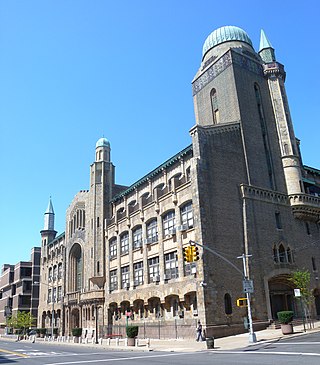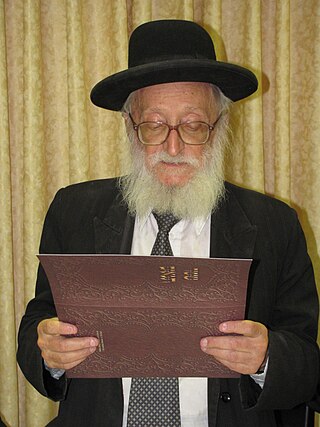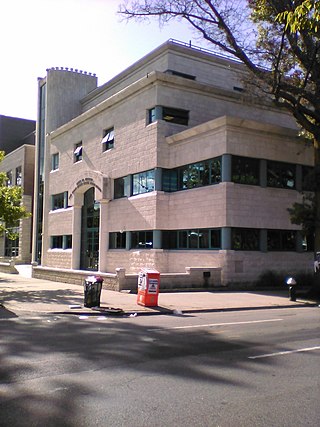
Shraga Feivel Mendlowitz was a leader of American Orthodox Judaism and founder of institutions including Torah U'Mesorah, an outreach and educational organization. In 1921 he became principal of Yeshiva Torah Vodaas, an early day Brooklyn-based yeshiva initially founded as an elementary school in 1918. He subsequently added a high school and post graduate program to the yeshiva. His policies were often informed by the Orthodox philosophical movement Torah im Derech Eretz.

Ner Israel Rabbinical College, also known as NIRC and Ner Yisroel, is a Haredi yeshiva in Pikesville, Maryland. It was founded in 1933 by Rabbi Yaakov Yitzchok Ruderman, a disciple of Rabbi Nosson Tzvi Finkel, dean of the Slabodka yeshiva in Lithuania. Rabbi Aharon Feldman, a disciple of Rabbi Ruderman and a member of the Moetzes Gedolei HaTorah of America, became its head in 2001.

Alter Chanoch Henoch Hakohen Leibowitz was an Orthodox rabbi who was Rosh Yeshiva (dean) of Yeshivas Rabbeinu Yisrael Meir HaKohen, which was founded by his father Rabbi Chaim Dovid Hakohen Leibowitz in 1933.
Fasman Yeshiva High School, known colloquially as Skokie Yeshiva, is an Orthodox Jewish all-boys high school in Skokie, Illinois. Fasman Yeshiva offers a dual curriculum of secular and Judaic studies.

The Marsha Stern Talmudical Academy, also known as Yeshiva University High School for Boys (YUHSB), MTA or TMSTA, is a Modern Orthodox Jewish day school and the boys' prep school of Yeshiva University (YU) in the Washington Heights neighborhood in the New York City borough of Manhattan. It is the brother school to the Samuel H. Wang Yeshiva University High School for Girls.

Tomchei Tmimim is the central Yeshiva of the Chabad-Lubavitch Hasidic movement. Founded in 1897 in the town of Lubavitch by Rabbi Sholom Dovber Schneersohn, it is now an international network of institutions of advanced Torah study, the United Lubavitcher Yeshivoth.

Oholei Torah is the common name of the Lubavitch schools Educational Institute Oholei Menachem and Talmudical Seminary Oholei Torah. The main branches of the school and its administrative offices are located in Brooklyn, New York City.
Rabbi Shlomo Porter is the executive director of the Etz Chaim Center for Jewish Learning. He is a past president of AJOP , and also has served as an AJOP trustee since its founding in 1985. Rabbi Porter currently resides with his wife Shoshana (Ungar) Porter in Baltimore, Maryland.
Zvi Sobolofsky is a rosh yeshiva at Yeshiva University in New York City.
Yeshiva Bais Moshe, is a Haredi Jewish High School and Seminary (Yeshiva) in Scranton, Pennsylvania. It was founded in 1965 by its Roshei HaYeshiva (Deans) - Rabbi Chaim Bressler and Rabbi Yaakov Schnaidman, disciples of the late Rabbi Aaron Kotler, founder and Rosh HaYeshiva of Beth Medrash Govoha in Lakewood, New Jersey.
Mesivta is an Orthodox Jewish yeshiva secondary school for boys. The term is commonly used in the United States to describe a yeshiva that emphasizes Talmudic studies for boys in grades 9 through 11 or 12; alternately, it refers to the religious studies track in a yeshiva high school that offers both religious and secular studies.

Chona Menachem Mendel (Mendel) Weinbach was an Orthodox Jewish rabbi, educator, author, and speaker. As the co-founder and dean of Ohr Somayach Institutions, a Jerusalem-based yeshiva for newly-observant Jewish men, he was considered one of the fathers of the modern-day baal teshuva movement.
The Talmudical Academy of Baltimore or TA is a K–12 yeshiva founded in 1917. Its present campus, located at 4445 Old Court Road, includes a pre-school building, an elementary school building, a middle school building, a high school building, three gymnasiums, a dormitory, two computer labs, and two study halls which double as prayer sanctuaries.

Yeshiva Shaar HaTorah-Grodno is an Orthodox yeshiva and high school in Kew Gardens, Queens, New York. It was founded in 1974 by Rabbi Kalman Epstein and Rabbi Sholom Spitz. It has programs for high school boys, as well as undergraduate and graduate programs that result in Talmudic law degrees.

Yeshivas Ohr Hachaim is a Haredi yeshiva located in Kew Garden Hills, Queens, New York City. The yeshiva also has a kollel, and operates in conjunction with its high school Mesivta Yesodei Yeshurun which is located next door to Yeshivas Ohr Hachaim. The current Rosh Yeshiva is Rabbi Doniel Lander and the Rosh Kollel is Rabbi Shmuel Rabinovici. Both are former students of Rabbi Joseph B. Soloveitchik of Yeshiva University.

Yeshivas Knesses Yisrael was a yeshiva located in the town of Sloboda Vilyampolskaya in the Kovno Governorate of Russian Empire. It functioned from the late 19th century until World War II.
The Institute for Advanced Judaic Studies is a Canadian Orthodox Jewish yeshiva. It is accredited by the Ontario Ministry of Education as a private university and has sovereignty to award bachelor's, master's, and doctorate degrees in Talmudic law and Judaic studies.

Rabbi Elyakim Getzel Rosenblatt was an American Orthodox rabbi. He was the founder and rosh yeshiva of Yeshiva Kesser Torah in Kew Gardens Hills, Queens.
Yeshiva Ohel Torah-Baranovich, commonly referred to as the Baranovich Yeshiva or simply as Baranovich, was an Orthodox Jewish yeshiva in Baranavichy, Belarus. Established circa 1906 by Rabbi Yosef Yoizel Horowitz, the Alter of Novardok (Navahrudak), it attracted leading rabbis such as Rabbi Yisroel Yaakov Lubchansky and Rabbi Avraham Yoffen as instructors, but was forced to disband with the outbreak of World War I. After the war, Rabbi Elchonon Wasserman, a student of the Radin Yeshiva who had been forced into exile in Smilavičy during the hostilities, agreed to serve as rosh yeshiva (dean) upon the recommendation of the Chofetz Chaim. In the interwar period, the yeshiva gained widespread fame and a large student body. Wasserman's style of teaching emphasized the simple meaning of the Talmudic texts and students advanced to the point that they were able to study independently. The yeshiva went into exile and disbanded a second time during World War II, and Wasserman and many of the students were murdered by Lithuanian Nazi sympathizers. Torah institutions named after the Baranovich Yeshiva and Wasserman were later established in the United States and Israel.












